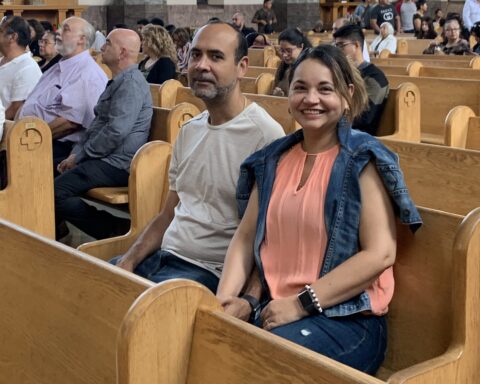While for many, immigrating to Canada is a dream predicated on the promise of finding work in a relatively peaceful country, settlement experts worry the government does virtually nothing to prepare families for the inevitable changes in parental and familial dynamics that occur with such a move – and the consequences of it.
“They never talk about parental identity. This complicates things because they aren’t told they’ll have difficulties with their partners and children,” says Myriam Coppry, founder and CEO of NunanuQ Services Interculturels in Montreal, a clinic that helps parents navigate familial crises.
“The reality is that the family structure will change. The father will have more household duties and everyone will need to do tasks that are usually done by domestic workers in other countries but are expensive in Canada. These and other factors can destabilize the family.”
According to a study by California State University, Fresno, many immigrants move from countries where machismo – a culture where men have dominance, power, control, and superiority over women – is ingrained and roles are clearly defined: the man is the primary provider, and his contribution to household chores is minimal. The study found these traits can be found in various ethnicities including Latinos, Africans, Asians, Indians and White Americans.

Similarly, in “Canadian Settlement in Action: History and Future,” a study published by NorQuest College, Amrita Hari describes points of systemic barriers that perpetuate traditional gender roles among Indian couples living in Ontario. She says things become complicated when the man earns more.
“Almost all couples agreed that the female partners would ‘scale back’ their career progressions to take care of children because their male partners earned higher wages,” she writes. “Despite the couples’ preference for an egalitarian relationship in career and home life, systemic barriers to the labour market shaped the couple to maintain typical gender roles in the family.”
Things can worsen if the husband can’t find equivalent work to what he had in his home country and feels diminished in the eyes of his family. Problems arise when the wife and children arrive first, and the husband continues to work and send money. Then, upon arrival, he finds his family dynamic has changed, with a more independent wife and a limited role for him.
Coppry, who has established a network of parental coaches in Canada and other countries and works with migrant families in crisis, adds that “on the other hand, many women aren’t used to managing the family allocation or subsidy because men traditionally control the money. It’s part of their traditional role as providers.”
Of course, there are no hard rules to adaptation and integration, which makes it hard to know how migrants will handle their family problems and personal situations 100 per cent of the time.
For some, marriage can help maintain their original way of life, while for others it might mean having to learn new tasks and social norms.
Drastic change can be good
Manuel Estrada and Amada Aldama moved to Drummondville 15 years ago, looking for a better life for their two children, who were each 18 months and three-and-a-half years old. In Mexico, she worked in marketing, and he was an executive in an oil company.
Aldama says when they were in Mexico, they could afford to hire the help of a domestic worker who would assist them twice a week with household chores. They also had the help of a relative who would watch the children during the day, while they both worked until late.
“When we got home, we only had time to tidy up a bit, have dinner, and go to sleep,” Aldama recalls of the difficulties they faced back home. “Manuel always bathed and put the kids to bed, but other than that, I handled household responsibilities.”
But that would all change upon their arrival in Drummondville, Aldama says. For instance, she says here, her children began working at 16 or 17, “which was unthinkable in Mexico.”
And though they haven’t been able to hire help because “hiring someone to clean can be very expensive,” overall things have taken a turn for the better.
Now, they leave work early, and commute times are minimal. Aldama cooks almost daily for the family, especially dinner. Together, they handle cleaning, and Estrada has learned to cook, takes care of gardening, and handles plumbing and electrical repairs.
He is also responsible for doing laundry, drying, and organizing it; they’ve established rules, so their two teenagers don’t create messes: dirty clothes go straight into a basket.
“Everything else, we do together,” Aldama says, adding that while at first it seemed challenging, now their “mindset has changed.”
“Now we talk about ‘contributing’ to child and household care, rather than ‘helping out’ as if it were a favour. I’m not saying everything is perfect, but we’ve found what we were looking for,” she adds, noting her children are happy to help with things like emptying the dishwasher, taking out the trash, and cleaning the bathrooms.
‘They don’t push me to do anything’
Ozgur Guney is a 26-year-old Franco-Canadian studying accounting in Montreal, Quebec. His parents arrived from Turkey 30 years ago and live and work full-time, with his father in logistics and his mother in finance.
He says though his parents are Muslim, they have never pushed religion on him, and were always respectful of each other.
“They don’t push me to do anything, just that I don’t hang out with people who might be a risk or harm me in any way,” he says, noting that while his parents are observing Muslims, they have always been lax about it.
Oz, as his friends call him, knows that shortly after his birth, his father baptized him according to an Islamic ritual, whispering his name into his ear three times and saying a prayer for a happy life. His name wasn’t chosen at random: Ozgur translates to “free” or “independent.”
“My parents aren’t afraid that I’ll distance myself from them and make my own decisions,” he says.
Oz explains that although they mainly speak and cook Turkish food at home, they’re also not extreme about it. “My dad doesn’t eat hamburgers, but he loves French fries,” says Oz, noting that at school he also communicates in both French and English.
“It’s not difficult for me to move in and out of my home and navigate other spaces,” he says. “Everyone takes something from each culture.”
Ultimately, immigration is not merely an economic transaction, as the government often frames it. Coppry says it can feel like transplanting plants from one soil to another: there has to be a certain degree of crisis for growth to occur.
“The challenge is to ensure the plant continues to grow and doesn’t wither in the process.”
_________________________________________________________________
This is the first part of a two-part series on the impact of immigration on familial dynamics, by Abraham Rozenberg Kasman. Read the second story here: The Dynamics of Immigration (Part 2): Turning to religion
Abraham Rozenberg Kasman worked as an editor at several commercial magazines in Mexico, before moving to Montreal in 2020.



